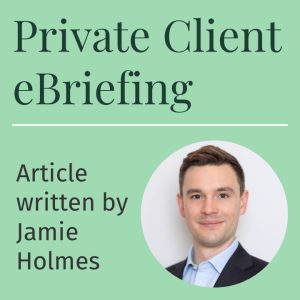To download and read this piece as a pdf, please click here.
Commentary by Lemuel Lucan-Wilson.
It has become cliché to say that modern familial arrangements are vastly different now to how they were 50 years ago, but that does not make it any less true. In 2019, almost half of all births were outside of a marriage or civil-partnership[1], and 3,440 children were adopted from local authority care[2]. With the passage of the Marriage (Same-Sex Couples) Act 2013, and the Civil Partnership (Opposite Sex Couples) Regulations 2019, the range of relationships that can be legally recognised, and the form that this recognition takes are also very different. Given the age of many settlements, traditional definitions of “children” or “spouse” can cause real difficulties.
Children
Historically, the common law definition of “children” did not include adopted or illegitimate children. These was addressed by the Adoption Act 1976 and the Family Law Reform Act 1987, but the changes were purely prospective– they did not apply to previous dispositions or settlements. The treatment of previous settlements is an issue which has plagued the courts for a significant time but was addressed relatively recently in Hand v George[3]. There, it was held that the limitation in the Adoption Act to solely future settlements meant that adopted children’s rights to respect of their private and family life and non-discrimination had been infringed. Rose J also concluded that whilst recognition of these rights from the date of the Human Rights Act 1998 taking effect might reduce the value of the vested interests held by certain grandchildren, some fluctuation had always been foreseeable from the birth of the settlement since there could have been any number of grandchildren, and that the right to non-discrimination overrode any arguments that could be raised on the grounds of the non-adopted grandchildren’s property rights under Article 1 of the First Protocol to the ECHR.
A similar decision was taken regarding illegitimate children in Re Druce’s Settlement Trusts[4]. Although this was a decision relating to the Court’s powers to approve a suggested course of action under s48 Administration of Justice Act 1985 rather than a substantive decision, HHJ Keyser QC expressed his view that the reasoning in Hand could apply to the Family Law Reform Act 1987. Thus, the rights of illegitimate children could be protected the same way as in Hand; nor would retrospectivity be a problem since the “expanded” definition would only apply to dispositions made after the HRA came into effect. Although this may seem settled, Hand has yet to be considered in the Court of Appeal, and there is considerable academic disagreement on it; as commented in PQ v RS[5], “there is doubt as to whether it will be followed”.
Spouses and Civil Partners
For married couples, similar reasoning might be possible: the Marriage (Same-Sex Couples) Act has as a similar provision relating to its purely prospective effect (Sch 4, Pt 1 para 1). There is, however, no similar provision in the Civil Partnerships Regulations, and the position remains unclear, although there are also no pre-existing common law rules which could serve to reduce the scope of the definition. In that absence, it may be that the court would be simply forced to make a declaration of incompatibility, which would do little to protect rights in question. The issue regarding marriages and civil partnerships is yet to be considered on any level.
Other developments
Alongside challenges to the definitions themselves, there is a growing trend of variation of trusts applications dealing with these issues. The courts are, on the whole, generally willing to approve variations that enlarge the class of beneficiaries to include adopted and illegitimate children, as well as same-sex spouses and opposite sex civil partners, given the societal changes which have taken place, see Duke of Somerset v Fitzgerald[6] and PQ v RS itself. Whilst a variation requires “benefit”, it is now settled that this benefit does not have to be financial and can include the “moral” benefit of fairness that comes with the knowledge that due respect is being given to relationships which modern society now recognises as worthy of it.
Conclusion
This is an uncertain area likely to be the result of further decisions once more contested applications are made. Clearly, in some cases the definition of “children”, ”spouse” or “civil partner” is likely to make a significant difference to the outcome, and it will be interesting to see if the reasoning Hand stands the test of time.
[1] Office for National Statistics, Birth Characteristics 16 November 2020; table 1. https://www.ons.gov.uk/peoplepopulationandcommunity/birthsdeathsandmarriages/livebirths/datasets/birthcharacteristicsinenglandandwales
[2] Children looked after in England including adoptions, 10 December 2020,
[3] [2017] Ch 449. https://explore-education-statistics.service.gov.uk/find-statistics/children-looked-after-in-england-including-adoptions/2020
[4] [2019] EWHC 3701 (Ch).
[5] [2019] EWHC 1643 (Ch) at [24]
[6] [2019] EWHC 726 (Ch)
For more information on our Trusts, probate and estates: non-contentious practice, please click here.





